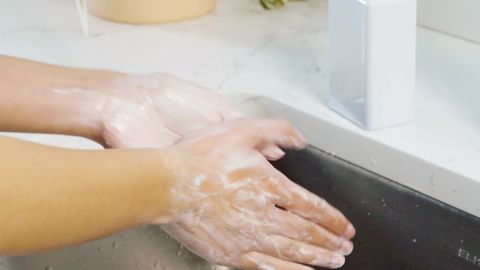We’ve come a long way since the very beginning of the COVID-19 pandemic, from the lifesaving vaccines and antiviral therapies that now help keep people safer and healthier, to being able to live life a little more “normally” now. But those aren’t the only ways life has evolved — the SARS-CoV-2 virus itself has changed slightly with each new variant, and that, in turn, has impacted the symptoms that occur when a person is infected. “The list of symptoms is now very long, but there are still some core symptoms that continue to carry over from variant to variant,” says Raj Dasgupta, M.D., pulmonary critical care specialist at Keck Medicine of USC in California.
One of those cornerstone symptoms that is still commonly seen today is fatigue, both during active COVID-19 infection and sometimes after a person has recovered.
What causes COVID-19 fatigue?
It’s complicated. If you’re testing positive for COVID-19 and actively infected, you likely feel fatigued because your body is fighting so hard against the virus. This is similar to what happens whenever you’re fighting off any type of illness — your immune system goes into overdrive, triggering inflammation and other symptoms that cause your energy to take a serious dip.
If you’re still fatigued even after you’re recovered from COVID-19 and are no longer testing positive, there could be a few things at play. “Your body just went through something, so you could have fatigue as a result of its efforts to fight it off,” says Shira Doron, M.D., infectious disease physician and hospital epidemiologist at Tufts Medical Center in Boston. “But there is still so much that we don’t know about this virus and the condition that’s called ‘long covid,’ so there could be something else going on that’s causing this fatigue, and this is what studies are looking at now.”
For instance, experiencing psychological stress before a COVID-19 infection was associated with a 45% greater risk of developing long COVID symptoms, according to a recent study by researchers at Harvard T.H. Chan School of Medicine. The “why” is still unknown, but that connection does make sense, says Dr. Doron. “The mind-body connection is one of the most mysterious things in medicine, so that’s why a large chunk of funding is devoted to exploring how your mental state going into COVID impacts you physiologically during and after infection,” Dr. Doron adds.
Some other long COVID symptoms, such as increased incidence of sleep disturbances, could also contribute to fatigue because “what happens during the night obviously affects how you feel during the day, so being sleep-deprived could be making you fatigued in the first place or making the fatigue even worse,” Dr. Dasgupta says. Inflammation may also play a role in lingering fatigue, and there’s also a chance that the virus caused some internal damage (anything related to the heart or lungs can cause fatigue, he says), or worsened an underlying condition that already existed, Dr. Dasgupta adds, but there are still a lot of unknowns and more research needs to be done in that area.
What does COVID-19 fatigue feel like?
Fatigue is a tricky feeling to define, especially when it comes to COVID-19, which still isn’t well understood. “Everyone describes fatigue a little bit differently because it is so individualized,” says Dr. Dasgupta, but it definitely goes beyond the tiredness you feel around 3 p.m. or after a night of poor sleep.
When they’re testing positive for COVID-19, many patients report wanting to sleep frequently and find that any exertion or tasks make them profoundly tired, explains William Lago, M.D., a family medicine physician at Cleveland Clinic. It can cause an inability to function or get out of bed, Dr. Doron adds, and one thing that makes it different from just ordinary tiredness is that if you try to push through it, this can make it worse.
With fatigue after COVID, “many patients complain that it impairs their ability to do things like exercise or perform basic tasks. They may find that they have to rest after attempting to do things they can normally do just fine before getting Covid, and some patients have had fatigue severe enough that they have to stop working or curtail many things that they used to enjoy,” says Dr. Lago.
And it’s not necessarily just physical — fatigue can manifest cognitively, too. “A tired or brain fog-type feeling may arise when concentrating, calculating, writing, or doing other cognitive functions,” Dr. Dasgupta says. “And it could also present in the form of mood changes or patience — you just aren’t able to manage those things as well as you normally can before you were sick.”
How long does COVID-19 fatigue last?
There’s no definitive answer. When you’re infected with COVID-19, you may feel fatigued for a few days or until you recover and test negative. Fatigue that lasts beyond the acute infection period is even murkier. “It can last weeks, months, or even years,” says Dr. Dasgupta. “This is the time to focus on research that addresses symptoms like this. We have to see what solutions we can uncover to directly address whatever is happening that is causing a lasting symptom, such as fatigue. My prediction is that the next big research project is going to see what the role of these antiviral meds can be. We know they reduce the viral load — so could initiating these therapies earlier or in more patients decrease long covid symptoms? I think that’s the next hot topic.”
How to treat COVID-19 fatigue:
There’s no cookie cutter solution or 5-step plan that is proven to help you overcome fatigue faster. But accepting that you’re dealing with a real condition is a good first step. “I tell this to all of my patients. Many are frustrated because they feel some people or even medical professionals don’t believe that their symptoms are real, but they are,” Dr. Lago says.
There are also lifestyle habits you can implement that may help. “It really comes down to the pillars of good health that support a strong immune system and good overall health,” Dr. Dasgupta says. “You want to do your best to help protect yourself from future infections before your body has had a chance to recover from this one.”
- Eat a healthy, balanced diet. Fill it with plenty of fruits and vegetables, protein, whole grains, healthy fats, and minimal sugar and alcohol.
- Exercise regularly. Listen to your body and don’t push yourself to do what you did before COVID — if you used to run but can now only handle a walk, that’s perfectly fine. “Even doing little things like taking the dog for a longer walk, playing with the kids outside, or avoiding the elevator can help you get those steps in and spark you to feel better,” Dr. Dasgupta says.
- Focus on sleep. Create a sleep routine that helps you wind down at night, says Dr. Dasgupta, and don’t be afraid to talk to your doctor about what changes or medications might help you fall asleep or stay asleep, if you’re struggling with that.
- Minimize and manage stress. “Stress and COVID are definitely linked, and feeling fatigued can make the mental toll hit harder or make anxiety or depression harder to handle, so finding ways to address your mental health is super important,” says Dr. Dasgupta.
- Consider getting vaccinated and boosted. “I tell my patients to still consider COVID-19 vaccinations and boosters to prevent severe illness and further complications,” Dr. Lago says.
What to do if your COVID-19 fatigue lasts a long time or gets worse:
“I would definitely recommend that anyone experience post-COVID fatigue talk to their primary care physician,” says Dr. Lago. “While we still don’t have a definitive cure, they are in the best position to make sure there is nothing else that could be causing it. Fatigue can be caused by numerous things, and they can help to separate out what is possibly Covid-related from what could be a totally unrelated problem.”
Alyssa is a senior editor for the Hearst Health Newsroom, where she has written research-backed health content for Prevention, Good Housekeeping and Woman’s Day since 2017. She has more than 13 years of reporting and editing experience and previously worked as research chief at Reader’s Digest, where she was responsible for the website’s health vertical as well as editing health content for the print magazine. She has also written for Chowhound, HealthiNation.com, Huffington Post and more.
This content is imported from OpenWeb. You may be able to find the same content in another format, or you may be able to find more information, at their web site.


